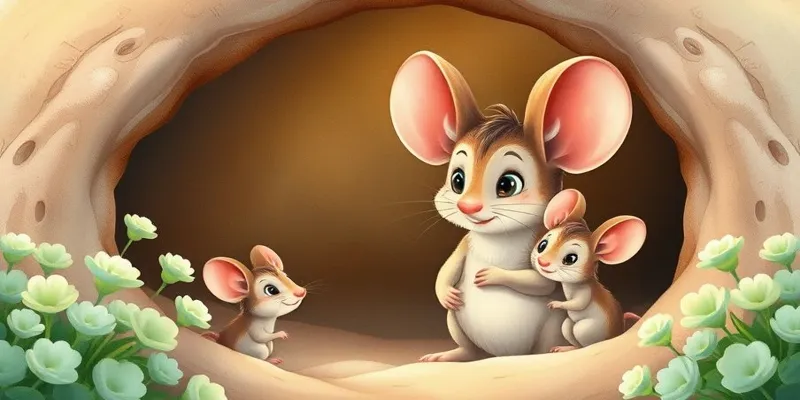
The Song of Everywhere Mina’s Big-Eared Adventure Tale
Mina was a meadow mouse with the tallest ears in Willow Wood. Her ears were so tall that when the wind whispered, she could catch the very first hello. She lived in a cozy burrow by a clover patch with her mother and her baby brother, Pip. At bedtime, Pip always asked for the same song, and Mina always hummed the same tune, soft as thistle fluff. But one spring morning, while Pip napped and the dandelions wore golden crowns, Mina said, “I wish I knew a song that sounded like the whole wide world, so Pip could dream of every place there is.”
As soon as she said it, the wind answered. It curled a ribbon of light around her paws. It wasn’t just one color. It was green like new leaves and blue like deep water and gold like sunlight and silver like moonlight. The ribbon twined into a loop and made a gentle doorway in the air.
“Hello?” Mina squeaked, tilting her head.
“Hello,” said the doorway, and it sounded like rustling grass, like waves, like wings. “You have a big wish and big ears. Will you come gather a song?”
Mina’s whiskers trembled. She wanted to say yes and no at the same time. That happens when you are very brave and very small. She looked toward the burrow. Pip breathed in and out, in and out. Mina tucked the little acorn bell he liked under his paw, then left a note for her mother: Back for supper. Promise. Gathering a song.
“Okay,” she told the ribbon. “But I have to be home before the shadows are long.”
“Step through,” said the doorway.
On the other side, the world smelled like rain after weeks of sunshine. Trees rose like green umbrellas. High above, the leaves made a roof sprinkled with light. A pair of golden eyes watched Mina from a branch.
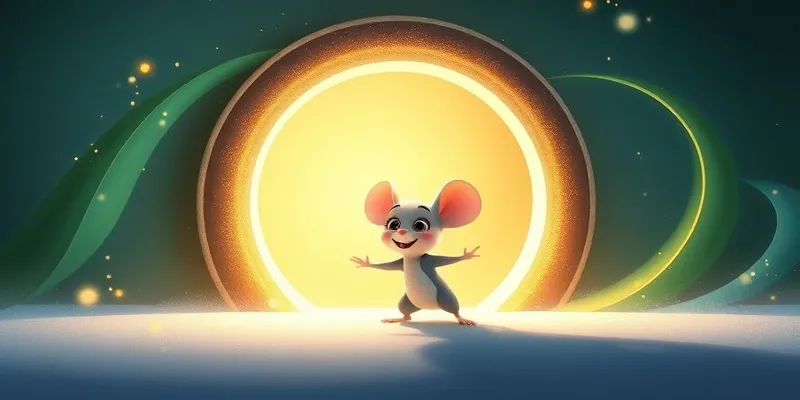
“Good morning,” said a voice as soft as moss. “I am Olive the owl. Who, who are you?”
“I’m Mina,” Mina said. “I’m collecting a song that sounds like everything.”
Olive fluttered down. Her feathers made hardly any sound at all. “Would you listen to our forest’s verse? We can help you, and you can help us.”
Mina cupped her ears. “What can I learn here?”
“In the forest,” said Olive, “we learn to listen. My feathers are soft so I can fly quiet and hunt at night. The chipmunks chirp when danger comes. The brook sings after rain. If everyone listens, everyone learns.”
Just then, the brook stopped singing. It hiccuped. “Oh!” cried a chorus of frogs. “One of our tadpoles took a teeny tiny trip down a leaf gutter and is stuck under the root.”
Olive blinked her bright eyes. “Mina, you are small and clever. Could you help?”
Mina scampered to where the root curled like a sleeping snake. She put her ear close and heard the faintest swish. “I hear you,” she called. “Don’t be afraid. Forest friends are near.” Carefully, she wriggled down, wriggled up, and gently nudged the little tadpole back into the shallow, where mama frog could scoop him. Everyone hummed with relief, and the brook began to sing again.
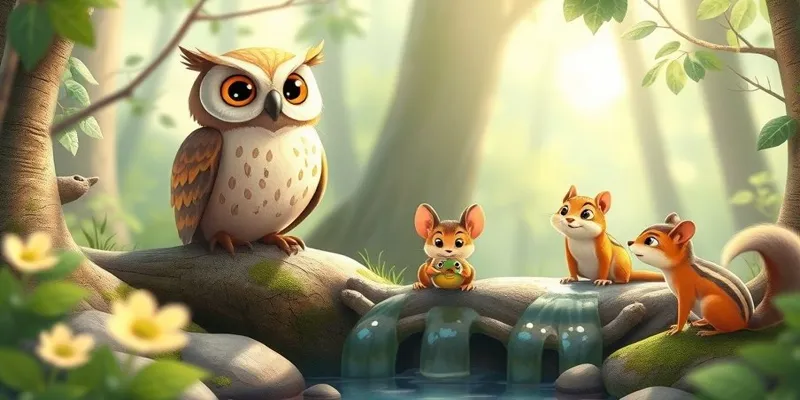
Mina listened, and her ears filled with a rustle ripple song: leaves whispering, acorns dropping, owl wings, frog croaks, water chuckle chuckling. It sounded like the beginning of something.
“This verse is for you,” Olive said, and the ribbon of light glowed green. “Remember: listen for small sounds. They tell big stories.”
“Thank you,” said Mina. “I will.”
The doorway fluttered and opened again, but this time the air that swept through was warm and dry, and the light turned golden like warm sand. Mina stepped into a world where the ground was soft and the sky was wide as a lion’s yawn. Sand dunes rolled like sleeping whales. The sun painted everything the color of toast. A pair of enormous ears popped out from behind a scrubby bush, followed by a twitching nose.
“Hello!” squeaked the creature. “I’m Finn, a fennec fox. We nap by day and play by night. The desert is a quiet place with a loud sky.”
“I’m Mina,” Mina said, shading her eyes with one paw. “I’m collecting a song.”
Finn flicked his ears. “Then you must learn our verse. In the desert, we learn to save. We save water, we save shade, and we save our runs for cool evenings. Follow me in the shadows.” He darted from the shade of one rock to another so Mina wouldn’t get hot. “See the camel?” Finn pointed with his nose to a gentle, long lashed animal loping along. “Her name is Sora. Her eyelashes keep sand out, and her feet are soft to spread on the dunes.”
Sora dipped her head. “And this hump holds fat, not water, but it helps me go far in a dry place.”
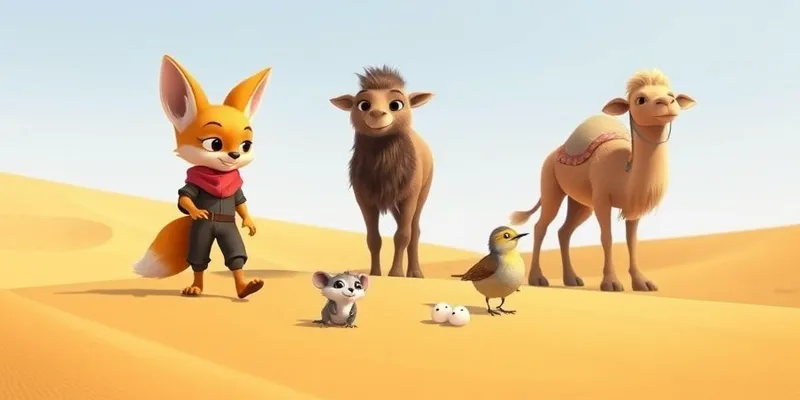
A fluttering sound came from behind a prickly cactus. A little lark hopped in circles, fanning her wings. “My eggs,” she trilled. “The wind blew tumbleweed around them, and now they’re fenced in, and my chicks can’t get out when they hatch.”
Mina thought. The cactus was prickly, but the tumbleweed was light. “Finn, can you dig on that side where it’s shady?” she asked. “Sora, could you nudge the tumbleweed gently with your nose if I pull with my tail?”
They worked together: scratch, push, tug. The tumbleweed rolled away like a spiky ball. The mother lark chirped a song that sounded like water drops on tin. Mina felt the desert hum under her paws. It was a quiet hum you only heard when you held still.
“This verse is for you,” Finn said, touching his ear to Mina’s. It sounded like wind dancing over dunes and a heartbeat that said, Save and share, save and share. The ribbon glowed gold.
The doorway shimmered again. This time the air was cool and smelled salty. The sound came first: shhh shhh shhhh. Mina stepped out and the sand was mixed with seashells that tickled her toes. The ocean stretched farther than any meadow. A smooth head popped up beside her, and two kind eyes blinked.
“I’m Ola the octopus,” said a voice from beneath a tide pool. Eight curious arms waved. Her skin changed from bumpy rocks to smooth seashell pink. “Sometimes I match my home. It’s safe and helpful. I can be a rock, a shadow, or a splash of coral.”
“Wow,” said Mina. “I can’t do that.”
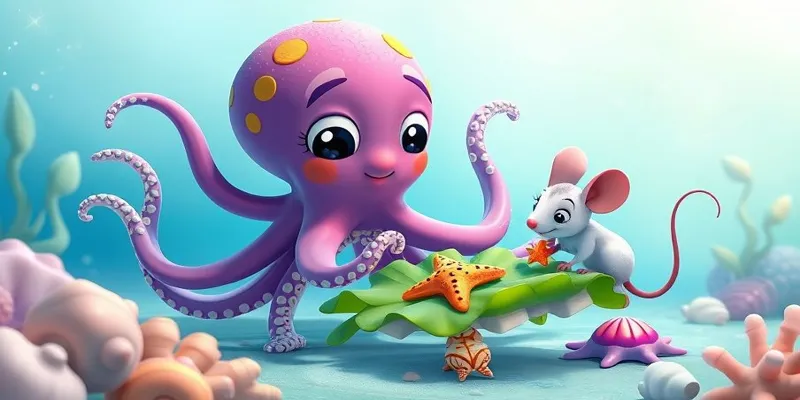
Ola bubbled with laughter. “You can do plenty. Will you learn our verse and help us solve a puzzle? There is a current today that keeps carrying our sea star friend into a crack. She can’t climb out she keeps slipping.”
Mina peered in. A sea star with five arms wriggled gently, waving hello. The water kept pushing her into a little crevice. It wasn’t deep, just tricky.
Ola thought aloud. “Currents are like invisible rivers inside the ocean. We use them to travel, but sometimes we need to rest.”
Mina looked around. “What if we make a place for her to cling?” she asked. “A little raft, but underwater.”
They gathered two sturdy pieces of sea lettuce and a strip of kelp. Ola’s arm tied them in a twisty knot only an octopus could make. They gently slid it into the water near the sea star. Once the sea star felt the lettuce, she gripped and inched along, arm by arm, until she was out and safe.
The sea star lifted one arm like a wave. Mina laughed, and a song swam up to her: whales low and long, dolphins clicking, fish shoaling like silver bells. “In the ocean,” said Ola, “we learn to float and to go with the flow, and to hold on when a friend needs a hold. This verse is yours.”
The ribbon shimmered blue, and another doorway opened, blowing tiny crystals that sparkled like sugar. Mina shivered, but her whiskers did a happy dance. Snow and ice stretched in shining sheets. The sky felt tall, and the world made sweet squeaky sounds under her paws.
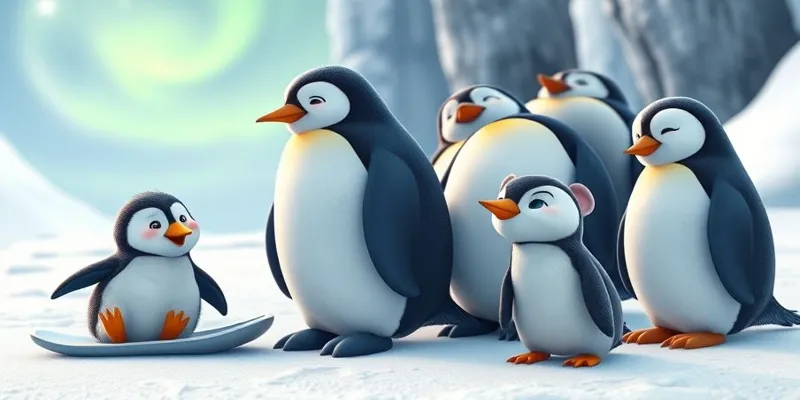
A small, plump bird in a tuxedo slid on its belly toward her with a giggly squeal. “I’m Pippin the penguin! Do you like to slide? It’s called tobogganing. We waddle doddle and slide whoosh!”
Mina giggled and tried a tiny slide. “I’m gathering a song,” she chattered.
Pippin flapped his short wings. “Then take our verse. In the ice world, we learn to huddle. When the wind sings sharp and the night is long, we stand close. We take turns standing on the outside and on the inside, so everyone stays warm.”
Nearby, a crowd of penguins gathered in a circle, each bird leaning in. In the middle, a fluffy chick peeped. An icy gust puffed across the snow, and everyone shuffled, step step, switch swap. Now a different penguin stood on the wind’s side, and someone else got the cozy center. Mina’s heart felt warm even though her nose was cold.
A honking cry echoed. A little shadow flapped across the snow, trying so hard to fly that the tiny wings made whirring sounds. A young petrel had wandered from a cliff and was worried about the way home.
“Stay low,” Pippin advised. “The wind can carry you, but you need a good path.” Mina’s ears caught a soft booming from the direction of dark rocks. “The sea is that way,” she said. “I can hear waves. If we walk together, the wind won’t boss you.”
So the penguins huddled in a gentle line around the little bird, and they waddled, wiggled, and tobogganed in a giggling train until the rocks rose up and the bird recognized home. She chirped thanks and dipped a wing.
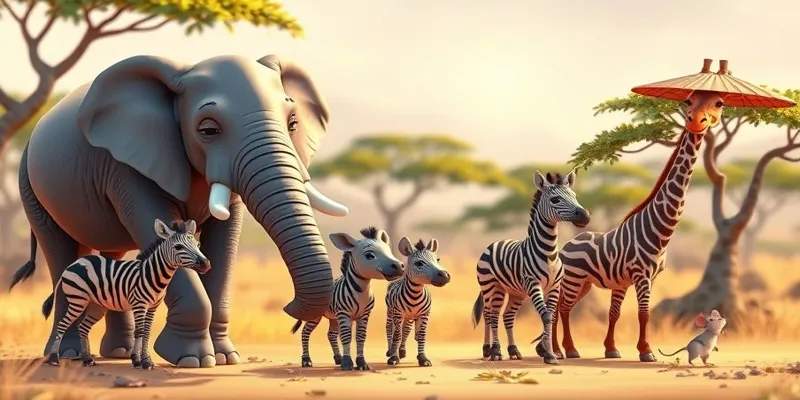
The ice sang to Mina then: it was a song like glass and laughter, with green lights that rippled across the sky, flicker flutter like curtains Pippin called them the southern lights. The ribbon glowed white.
The doorway breathed warm again, like a lion’s yawn, but different from the desert. Grass stretched like a green ocean, and trees with umbrella tops cast coin shaped shadows. Hooves thumped softly. A herd of elephants walked by, their ears flapping like fans.
A tall elephant with kind eyes and a trunk strong as a river held a baby’s hand trunk in her own. “I am Ama,” she said. “We are a family. Will you walk with us, little mouse?”
Mina hurried to keep up. “I’m gathering a song.”
“Then you must hear our verse,” Ama said, rumbling. “In the savanna, we learn to remember and to care. I remember the path to water. I remember the smell of rain. We care for the youngest and the oldest.”
A zebra fretted nearby, swishing her tail. “My foal wandered into that tall grass because the butterflies are dancing, and now he’s lost in the stripes of light and dark.”
Mina stood very still and watched the grass. It waved in the wind, making stripey patterns, just like the zebra’s coat. The foal’s ears poked up, twitchy and small.
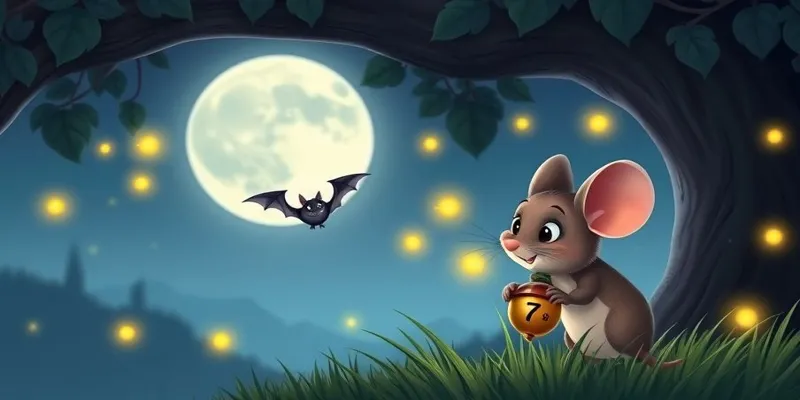
“Listen,” Mina whispered. A low hum rolled from Ama, a sound full of road dust and sunset. The foal’s ears turned toward it. “He hears you,” Mina said. “If we stand in a line between him and the butterflies, he’ll see one path your path.”
The elephants and zebras formed a slow, steady line. The foal saw the space between legs and stripes clearly now. He pranced toward his mother, and she nuzzled his neck with a sound so soft it made Mina’s eyes feel watery in a good way.
A giraffe stooped her long neck and plucked a leaf high above Mina’s head. “We all eat different foods,” she said kindly. “I like tender leaves. Zebras like grass. Lions like meat. Knowing what others need is part of caring.”
Mina’s ears filled with the savanna’s verse: drums of hooves, snorts and rumbles, a breeze that carried faraway thunder. The ribbon glowed a sunny green gold.
The doorway opened one last time, and this time it wasn’t to a place with ground and trees. It was to an evening sky right in her own meadow, where bats flicked like shadows and fireflies winked like tiny lanterns. A bat swooped close and hung upside down from an oak branch. “I’m Echo,” he squeaked. “I shout tiny songs and listen to the echoes, and they tell me where the bugs are and where to turn. Would you like to hear our verse before you go home?”
Mina plopped down on a tuft of grass. She was happy and tired, the best kind of tired. “Yes, please.”
“In the night world,” said Echo, “we learn that things can look different and still be friendly. Some of us fly in the dark and see with our ears. Some of us shine our own lights.” He nodded toward the fireflies, who blinked on off, on off. “But we all share the same sky.”
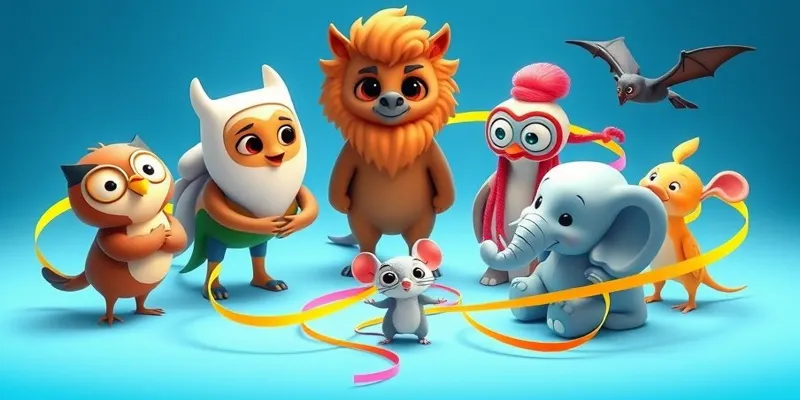
Just then, a breeze shook the oak, and something small fell and made a tiny clink. Mina looked and found acorn bells seeds that had dried and left whispering caps. She tied one with a blade of grass and shook it. It made a sound like Pip’s sleepy sigh.
Echo clicked a tune into the dark and listened. The fireflies flashed in time. Olive hooted far away. Finn’s desert wind hummed. Ola’s tide made shhh shhh shhhh. Pippin’s laughter from the ice tumbled like sleigh bells. Ama’s rumble rolled like distant thunder. The verses gathered around Mina as if the whole world were a circle and she was at the warm center. The ribbon of light quivered, full of every color.
“Thank you,” Mina told each friend, looking up, down, and all around. “Thank you for your verses. I’ll hum them for Pip.”
“Remember what you learned,” they said, one by one, in voices like leaves, like sand, like wave, like ice, like grass, like night. “Listen. Save and share. Float and hold on. Huddle and take turns. Remember and care. Things can look different and still be friendly.”
The ribbon bent toward her burrow, becoming the path home. Mina slipped through, and she was back in Willow Wood, where shadows had just started to get long, and swallows were drawing sky letters with their wings. Pip stirred and reached for his acorn bell. Mina put it into his hand and kissed his forehead.
“How was the day?” her mother asked, peeking in, her nose wrinkling with a smile. Mina told her everything in a flurry: the forest owl and the listening leaves, the desert fox with shade jumps, the ocean octopus who changed her skin and tied the clever knot, the penguins who took turns in the wind, the elephants who remembered the way to water, the bat who saw with his ears and the fireflies who wrote poems in light.
Her mother’s eyes shone. “That sounds like a very long song.”
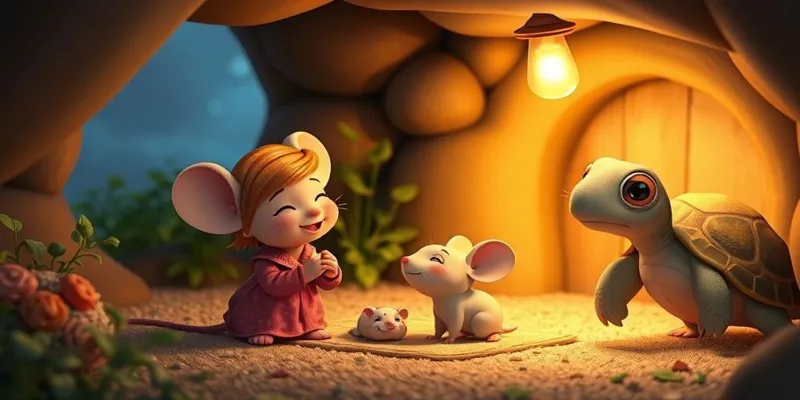
“It is,” Mina said, crawling into the nest. Pip blinked up at her, his ears small and soft, his eyes the color of warm fudge. “Ready?” she whispered.
She began with the forest: a rustle ripple lullaby. Pip’s eyelids drooped. She slid into the desert hum: save and share, save and share. Pip’s fingers loosened. She drifted to the ocean: shhh shhh shhhh, with tiny sea bell tinklings. Pip sighed and rolled onto his side. She added the ice: a giggle slide and the glow of faraway green lights, then the savanna’s rumble, steady and kind. Finally, she shook the acorn bell just once, so soft, and sang the night verse that said things can be different and still be friendly, and that the same sky is for everyone. The song wrapped around Pip like a blanket that had traveled everywhere and learned every voice.
When Mina looked up, her mother had leaned her head in, and even the old tortoise from the next burrow, Tully, had inched to the door to listen. Out in the meadow, the wind rested. The world seemed to hold its breath just to hear Mina hum.
When the last note floated away, Mina tucked the acorn bell into Pip’s paw again. He smiled in his sleep. Her mother kissed her between her tall ears. “That,” she whispered, “is exactly the kind of song a brother needs.”
Mina felt warm and floaty, like a leaf on a calm pond. She thought of Olive’s quiet wings, Finn’s quick feet, Ola’s careful arms, Pippin’s cheerful circle, Ama’s steady steps, and Echo’s laughing clicks. She thought of the lark, the sea star, the petrel, the zebra foal. She thought of how all the verses fit together without bumping, like puzzle pieces, like neighbors.
Outside, crickets fiddled under the moon. Fireflies blinked hello and goodnight. Somewhere far, far away, a whale sang into the deep. In the desert, the night bloomed with stars and tiny paws. On the ice, penguins traded places in their huddle. On the savanna, elephants walked under a sky spilled with milk. In the forest, Olive’s eyes glimmered as she watched over the brook. And in Willow Wood, in a burrow lined with clover smell, Mina curled around her brother and fell asleep, her ears full of the song of the world, knowing that if she ever wanted to go listening again, the rainbow ribbon would find her, because big ears and big wishes make wonderful doors.
And if you leaned very close, you could hear Pip’s quiet snore humming the last line, the happiest one of all: Home is where all the verses come to rest, and there is room for every voice.
